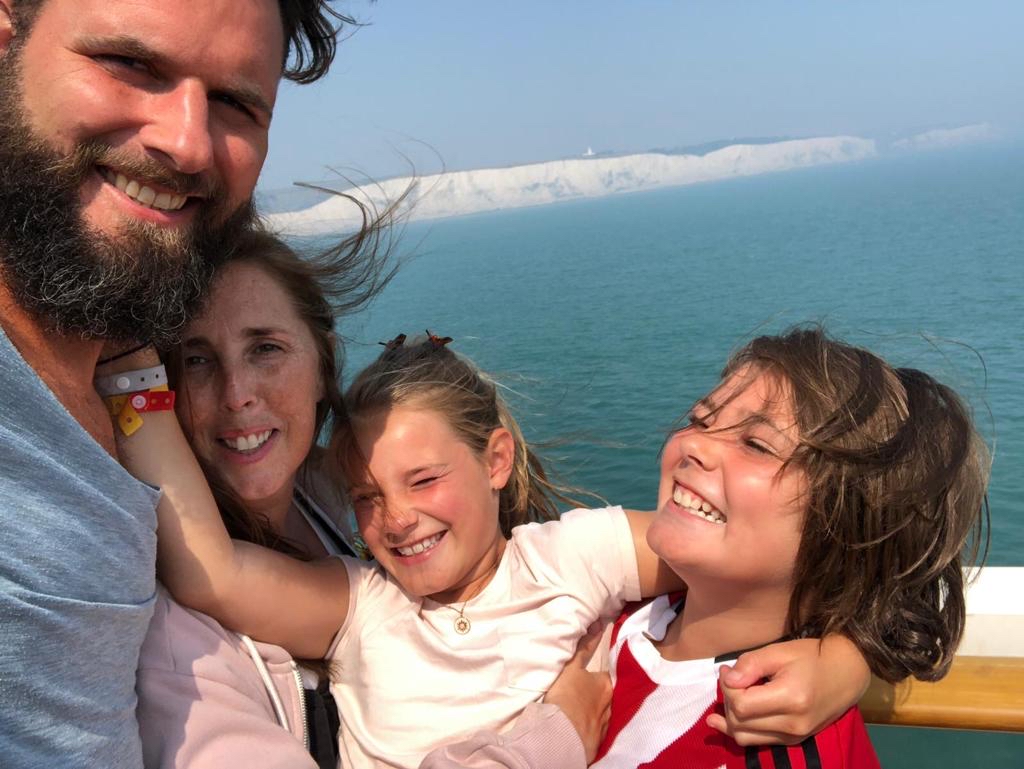I was diagnosed with melanoma in 2014, at the age of 35, after going to the GP about a small mole on my breast. The tumour was a really low stage – 1B – so the doctors all reassured me that I had nothing to worry about, and I was booked in for surgery to remove it.
It was quite a difficult recovery following the operation, and I struggled to carry my two children, Ted and Florence, who were both quite little at the time – but the important thing was that the tumour had been removed and we could get back to our normal family life.
My stage 4 diagnosis was devastating
By the time I’d had the operation though, it must have already been too late. I found a lump in my armpit a year later and then we learned the cancer had spread.
I had a full lymph node dissection and started a course of radiotherapy, but while I was undergoing treatment, the cancer returned to the lymph nodes in my armpit. They were taken out but, four months later, it appeared in a node near my clavicle. I was just unlucky. And at the age of 37 I was diagnosed with stage 4 melanoma.
Finding a treatment that works for me
Despite starting immunotherapy, the disease continued to progress, so in February 2018 I was put on targeted drugs called dabrafenib – a treatment underpinned by the ICR’s science – and trametinib. Incredibly, my first scan came back clear, and two years later my scans are still showing no evidence of disease.
I remember at the time of my stage 4 diagnosis, my oncologist had asked me what I wanted to achieve, and I’d said “I want to turn 40”. I had my 40th birthday in February this year, and in March we celebrated my husband Chris’ 40th too.
Feeling so healthy now is such a gift
I’m so lucky to have found a treatment that works for me, and the fact I feel so healthy and well just feels like such a gift. The knowledge that you have cancer never leaves you, but being on these drugs means I can try and live my everyday life.
I know that the drugs could stop working at any point, but I just want to make the most of the time I have now to spend with my family.

We’ve got lots of memories to make and we’re trying to travel as much as we can. It’s really important for Chris and I to see the world with the kids – Ted is now 12 and Flo is 9 – and make incredible memories we hope they’ll never forget. We have a campervan we call Big Bertha which we all love – and we’ve spent two summers touring round Europe in her. Chris and I let the kids sleep inside and we sleep in the awning.
Last Easter, we were also lucky enough to go to Thailand. It’s the biggest trip we’ve been on as a family, and it was incredible – a once-in-a-lifetime holiday.
“It’s the ‘everyday’ memories I really want”
But ultimately, like lots of other cancer patients in my situation, it’s the ‘everyday’ memories that I really want to have. Flo recently had her ears pierced, which is something I didn’t think I’d get to see – it might not sound like a big deal, but it was a rite of passage that I wanted to be there for.
I want to see Ted start secondary school in September. I want to see Flo grow into a teenager. I want to be here for school plays and football matches, for trips to the park and for birthday parties.
We don’t know how much time we’ve got left together as a family, and I am worried that a lot of cancer research had to pause due to the outbreak of coronavirus. If my cancer develops resistance to the current treatment I’m on, I won’t have any other options left.
Kick-starting the ICR’s research is crucial
For patients like me, the ICR’s work to tackle drug resistance and discover smarter and kinder treatments is crucial. Now that their labs are reopening and their scientists can return to work, I’m hopeful we can help them make up for the research hours that were lost during the last few months.
Every day is valuable. My family and I still have more memories to make together, and we rely on researchers at the ICR to make this possible for the years to come.
How you can help
Our research has been on hold during the coronavirus crisis, but cancer has not.
The pandemic has been a setback for cancer research but, with your support, it doesn’t have to mean long-term damage to our progress to defeat cancer.
Please make a donation today to kick-start our vital work, to ensure patients like Sally don’t get left behind.